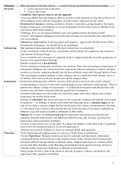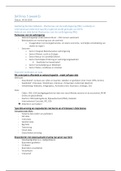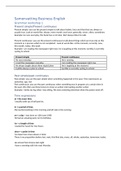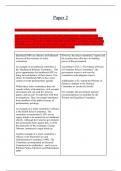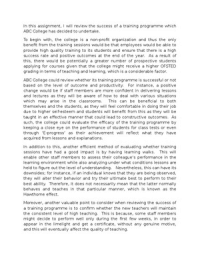Diversity 1. God’s universal will of salvation.
2. Jesus is the Christ.
Gradation: from open to close in salvific approach
Focus has shifted from the religious other as a problem to the question of what the significance of
these religions can be from the perspective of God's salvific intentions for the world.
Hermeneutical openness: seeking correlation, balance, connections, giving benefit of the doubt,
trying to make sense of something we do not understand. Hermeneutical openness should precede
soteriological appreciation/judgment.
Challenge: How we can remain faithful to our won tradition before becoming closed?
Concern: Interreligious dialogue involves the risk of losing our own identity and commitment to
our own tradition.
Openness as Appreciation: it can be positive and negative – appreciation should always follow
hermeneutical openness – we should all try to understand.
Exclusivism The rejection of universal salvation is the most central view of exclusivism.
At the cornerstone of this model lies a pessimistic anthropology that emphasizes the sinfulness
and lostness of human beings.
Focus of mission and conversion. Exclusivism looks at religious plurality from the perspective of
human. Over against liberal theology.
Identity understood as discontinuity.
Christ is therefore ontologically constitutive for salvation. This is the epistemological requirement of
redemption. Religions are understood as the expression of human attempts to achieve salvation
on their own power, neglecting thereby the fact that salvation comes only through faith in Christ.
The soteriological a priori rejection of other religions offers a clearly described identity, but it is
an identity that comes at the cost of openness for the religious other.
Inclusivism Inclusivism starts precisely with the experience of the spiritual and moral value of other religions.
Understanding in ontological rather than epistemological sense. Optimistic anthropology. Other as
partner not a threat. Critique of exclusivism → it is difficult to reconcile with the idea that God
wants to save all. There is equality between people but not religions.
Christian truth claims are universally true, but truth claims from other religions also contain
some truth, but not the whole truth.
Identity as Continuity: but inclusivist focus on the continuity continues one-sidedly with respect
to openness → (1) dialogue is based on the belief that all people share a common origin; (2) not
only do we share a common origin, but the salvific goal of the history of humankind is the same,
i.e., the triune God. (3) there is the idea that the one divine mystery of salvation is mediated in
different ways and made accessible to adherents of other faiths.
Dupuis, the Trinity is the hermeneutical key for keeping the tension between identity and
openness, between individuality and difference, between unity and diversity, and between
particularity and universality in balance.
Openness as appreciation: yes, we see other. No, others are shadows of the final truth; if something
does not fit our Christian narrative, we do not appreciate it
Hermeneutical openness: tendency to focus on sameness rather than openness.
Pluralism Truth claims from all religions point to a universal Truth. Form of indifference.
Pluralist Hypothesis: Religious systems are merely culturally and historically determined
conceptualizations of and answers to the ultimate divine reality. Despite their historical and
culturally different interpretations of ultimate reality, religions participate in a similar salvific
process that Hick describes as the liberating transformation from egoism to being centred on
ultimate reality; (important distinction of ultimate and penultimate).
When people absolutize, their truth claims its untruth; its path to violence, disclination, and
oppression; thus, opposite of salvation.
1
, Pluralism Epistemologically speaking, the pluralist theory is inspired by the Kantian distinction between
the "noumenal" and the "phenomenal. Copernican revolution:’ Not Christ, not God but Ultimate
Reality is the foundational source of religious experience
Religious traditions are relative vis-à-vis Ultimate Ground.
The pluralist interpretation of interreligious dialogue rests on four pillars: (1) a phenomenology
of commonality (2) The de-absolutization of truth, and (3) symmetrical reciprocity between the
dialogue partners. Leading to (4) a dynamic relational understanding of religious identity that
makes openness for the religious other possible.
Pluralist interpretation of interreligious dialogue:
1. Relativity of truth claims – context affects what you see – cannot be obsolete.
2. Focus on the common ground: deep down we are not strangers we all are going
towards Ultimate.
3. Symmetrical reciprocity – all traditions are relative but we all, putting all traditions
Form of “meta-inclusivism”: pluralist understands the religious traditions better than their
respective adherents do. Problematic image of Rubicon (close vs. open)
Pluralism thus distinguishes between two perspectives: (1) the perspective of the religious
traditions for which the differences are relevant; and (2) the perspective of the Real on the basis
of which it becomes clear that the differences are merely secondary and relative.
The tragic history of interreligious violence has left pluralists with a deep distrust of absolute
truth claims.
John Hick The core of this hypothesis is the idea that the different religious traditions “constitute different
ways of experiencing, conceiving, and living in relation to an ultimate divine Reality.
Experience as key category:The contemporary religious experience is a touchstone for and source
of religious knowledge; experience has cognitive power.
Inductive methodology: Starting from experience he builds his theory of religious diversity.
which transcends all our varied visions of it; (epistemology of experience).
Hick’s openness can be seen both in his philosophical reflections and in his theological work and
is translated methodologically into an inductive approach that starts from the world of actual
experience.
This “pragmatic” criterion for truth allows the pluralist hypothesis to conclude the soteriological
equality of the religious traditions without falling into relativism.
The centre of the religious universe is the Real – that is the ultimate religious object.
In addition, all religions are stamped by the same generic soteriological structure: they attempt
the transformation from self-centredness to Reality-centrednes.
Critique of » Pluralistic model cannot maintain its position as a supraconfessional theory.
Pluralism » Pluralistic model unfolds as a confessionally normative “pedagogical project” that is intended
to train adherents of different religions in the ability to participate in dialogue.
» It turns out to be a new missionary movement.
» The lack of insight into the unique nature of faith commitments; pluralist openness leads to
its opposite: hermeneutical closedness.
» The pluralist mistake lies in the insinuation that it can nevertheless be possible at a certain
moment to find immediate access to religious experience.
» Pluralism’s voluntary anthropology and the idea that the religious other is not strange are
disputable.
» Pluralists lack “one of the defining characteristics of the very religion it is trying to explain,
namely its concrete engagement or commitment.”
» Pluralism lays down the wrong rules. The rules that pluralists prescribe
are counterproductive for interreligious dialogue: they lead to hermeneutical closedness.
» Pluralism claims to be a form of mature faith: it does not worship any false gods but
understands what is penultimate and what is ultimate.
2

